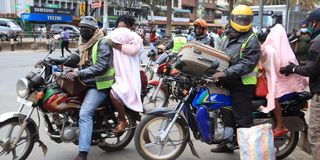Tune boda boda for youth

Boda boda riders pick passengers at Kencom stage after Nairobi Metropolitan Services barred Public Service Vehicles from accessing the area on June 18, 2021.
What you need to know:
- Motorcycle taxis began in 2008 when the government zero-rated import duty on motorcycles in a bid to create jobs for unemployed youths.
- Earning Sh400 million on average daily, equivalent to Sh146 billion annually, the sector is perceived as one of the unexploited potential tax bases.
Over the recent years, the country has witnessed the proliferation of motorcycles, especially for public transport. More widely known as boda boda, the machines have increasingly become a popular income earner but are fast gaining notoriety as a fatal attraction with reckless riders operating with impunity.
Recently, Interior Principal Secretary Karanja Kibicho, in a meeting with regional and county commissioners, warned riders who are allegedly hired and protected by politicians to commit felonies.
Motorcycle taxis began in 2008 when the government zero-rated import duty on motorcycles in a bid to create jobs for the thousands of unemployed youths. That saw 51,412 motorcycles registered, up from 16,293 the previous year. The number of newly registered motorcycle hit a record 1,393,390 in 2018.
Earning Sh400 million on average daily, equivalent to Sh146 billion annually, the sector is perceived as one of the unexploited potential tax bases. Motorcycle and spare part sales have shot up from Sh8 billion in 2014 to a record Sh11.3 billion in 2018.
More inclusive policy
As it grows in leaps and bounds, a well-founded comprehension of the sector and socioeconomic effects on the economy and society is imperative.
Deaths from boda boda-related accidents have negative effects on the economy. Most families have lost breadwinners and incurred huge hospital bills as most of the victims are poor and uninsuranced. Most of the riders are unlicensed and lack adequate safe riding skills.
Creating a database of all operators through mandatory registration, refresher training and rider testing can help to regulate the sector. With 500,000 to 800,000 youth entering the job market every year amid limited employment opportunities, the government should adopt a more inclusive policy approach to empower the informal economy.
Mr Ochieng is a student at Kenya Institute of Mass Communication (KIMC). [email protected]





